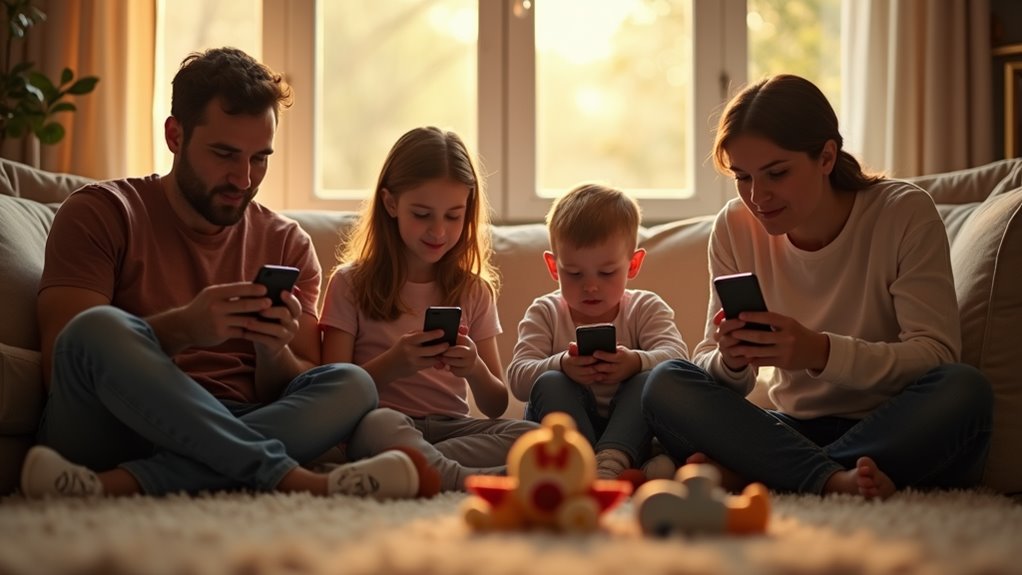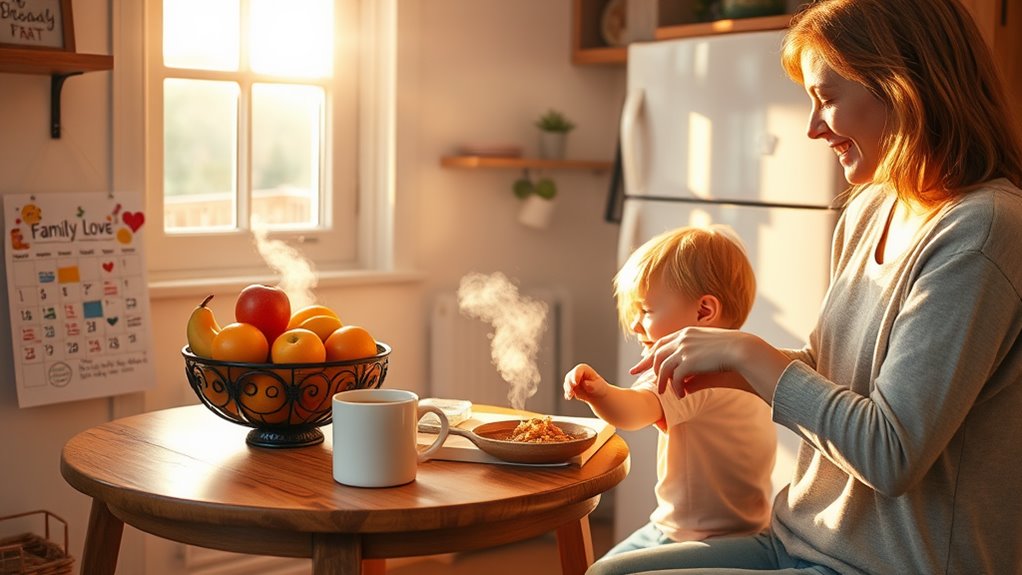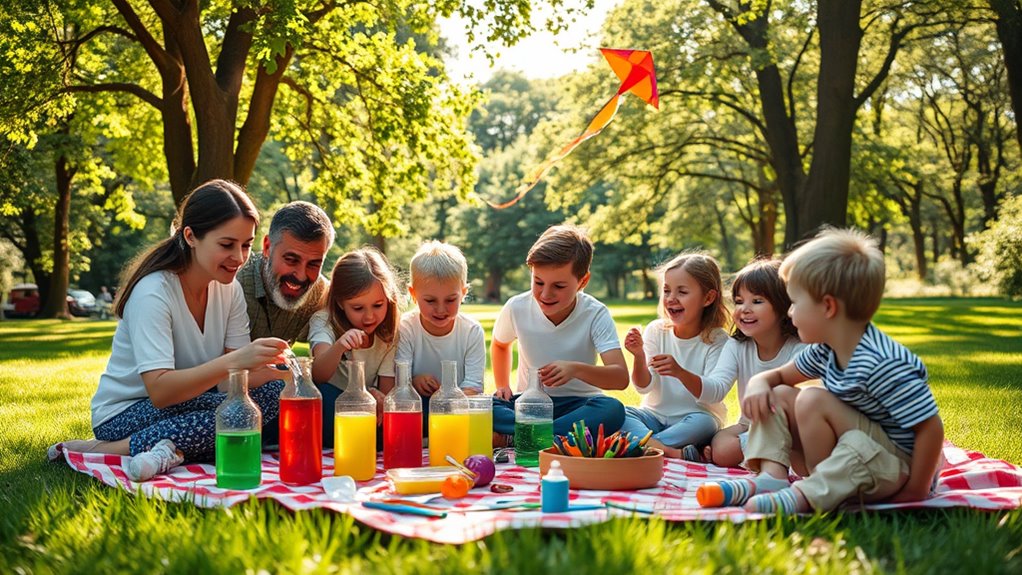Social media can really spice up family dynamics! It helps you share funny moments and celebrate milestones, which can strengthen your bonds. But here’s the catch: if you spend too much time online, you might miss out on real-life connections at the dinner table. Sometimes, messages can get misunderstood, leaving you scratching your head. Plus, privacy issues can pop up, making family trust a bit shaky. So, balancing online fun with face-to-face chats is key. If you stick around, you’ll discover even more ways to keep those family ties strong while traversing the digital world!
Evolution of Family Communication
Family communication has transformed dramatically over the years, and you’ve likely noticed these changes firsthand.
Remember when family dinners were the main time everyone gathered? Now, it seems like we’ve got our phones glued to our hands, even at the dinner table! In the past, families relied on face-to-face chats, letters, or landline calls.
But now, you can text your sibling in the next room, or video chat with Grandma from across the country. This shift has made it easier to stay in touch, but it can sometimes feel a bit weird, too. You might find yourself having deep conversations through emojis rather than words!
While texting is quick and convenient, it can miss those heartfelt moments you get when you look someone in the eye.
Also, don’t forget about the family group chats! They can be a source of laughter, but they can also get a bit overwhelming.
Positive Interactions Through Social Media
Social media can create countless opportunities for positive interactions among family members. You can share funny videos, photos from family gatherings, or even silly memes that make everyone laugh. This way, you keep everyone in the loop, no matter how far apart you are.
Imagine your cousin posts a picture of their new puppy. You can comment with a funny remark, and soon, other family members join in. It’s like a mini family reunion, right there on your screen!
You can also use social media to celebrate special occasions. Sharing birthday wishes or graduation messages can make your loved ones feel cherished, even if you’re not there in person.
Additionally, social media helps you stay connected with relatives you mightn’t see often. You can create family groups where everyone shares updates about their lives. This builds a sense of togetherness, and it’s fun to see what everyone’s up to.
Negative Effects on Family Bonds
Often, excessive social media use can strain family bonds rather than strengthen them. You might find yourself scrolling through your phone during dinner, missing out on conversations. Your family members could be doing the same, and suddenly, everyone’s in their own world. It’s like having a family dinner with a bunch of ghosts!
When you spend more time online, you might notice that quality time together slips away. Instead of playing games or watching a movie, everyone’s glued to their screens. You might even start to feel a little disconnected from each other. Remember the last time you’d a good laugh together? Social media can sometimes steal those moments, replacing them with likes and shares.
Plus, social media can lead to misunderstandings. You might misinterpret a post from a family member, and before you know it, there’s tension brewing. It’s much easier to type something snarky online than to say it face-to-face, right?
Social Media and Conflict Resolution
Maneuvering conflicts through social media can be a double-edged sword. On one hand, it’s super convenient to send a quick message instead of having a face-to-face chat. You can express your thoughts without worrying about immediate reactions.
However, texting or posting can easily lead to misunderstandings. You might mean one thing, but your words could be taken the wrong way. Yikes!
When you’re in a disagreement, emojis and GIFs can help lighten the mood, but they don’t always convey seriousness. Plus, typing in all caps? That’s often interpreted as yelling, even if you’re just excited! It’s important to remember that tone can get lost in translation.
If you find yourself in a tough spot, consider taking a break from social media. Sometimes, stepping away helps you think more clearly. You could even choose to resolve the issue in person later.
It’s all about finding that balance. Remember, while social media can help you communicate, it’s not always the best tool for solving conflicts. So next time you face a family tiff online, weigh your options. A little patience can go a long way!
Impact on Parenting Styles
Parenting styles are evolving, and social media plays a significant role in that change. Nowadays, you might find yourself scrolling through parenting blogs or social media posts for tips and advice. You’re not alone! Many parents are doing the same, sharing their experiences and discovering new ways to raise kids. This connection can create a sense of community, which is super important when you’re juggling the challenges of parenthood.
However, there’s a flip side. You might also feel pressured to keep up with other parents’ seemingly perfect lives. It’s easy to compare yourself and think, “Am I doing enough?” Some parents adopt more lenient styles, influenced by what they see online. They might be more relaxed about screen time or less strict about chores, believing that everyone else is doing it too.
On the other hand, some parents choose to be stricter, wanting to limit their children’s social media use. They worry about the impact of online interactions on their kids’ well-being.
Ultimately, social media shapes how you approach parenting, whether it inspires you or makes you question your choices. Just remember, there’s no one right way to parent!
Generational Differences in Usage
Generational differences in social media usage highlight how each age group interacts with technology uniquely. For instance, younger folks, like your friends, often jump onto platforms like TikTok and Snapchat, sharing quick videos and funny memes. They love to stay connected through fast-paced content and trends that change almost daily. It’s like a whirlwind of creativity, right?
On the other hand, older generations might prefer Facebook or Instagram, where they share family photos and catch up with friends. They often use social media to stay in touch with relatives or reconnect with high school buddies. Imagine your grandma posting a picture of her famous apple pie, just to make you drool!
Teenagers are usually more comfortable maneuvering through new apps, while parents might take a bit longer to figure them out. They might even ask you for help!
So, when you think about how you all use social media, it’s clear that each generation has its own style. Understanding these differences can help you connect better with your family, making conversations about technology more fun and engaging.
After all, sharing a laugh over a silly meme can bring everyone together!
Emotional Connections and Support
Social media isn’t just about sharing updates; it plays a significant role in fostering emotional connections and support among family members. Imagine seeing a funny meme your cousin posted that reminds you of a hilarious family vacation. You laugh, comment, and suddenly, you’re sharing that moment again, even if you’re miles apart!
When you share life’s ups and downs online, your family can rally around you like a superhero squad. Whether it’s celebrating a birthday with a virtual party or getting support during tough times, these little gestures help you feel connected.
Perhaps your sibling posts a picture of their new puppy, sparking a joyful conversation. You feel that warmth, even through a screen.
Plus, social media lets you stay in touch with family members you don’t see often. You can share milestones, whether it’s your kid’s first steps or your graduation, and get cheers from your loved ones who may live far away.
It’s like a digital hug, showing you that no matter the distance, you’re still part of each other’s lives. So, the next time you scroll, remember: it’s not just a feed, it’s a way to keep your family close!
Privacy Concerns and Family Trust
With the click of a button, you can share your life with the world, but this digital openness can raise significant privacy concerns within families.
Imagine posting a fun family photo, only to realize later that it’s drawn unwanted attention. Suddenly, your private moments aren’t so private anymore!
When you share personal details online, it can affect trust among family members. Kids might feel uneasy if their parents overshare, and parents might worry about their children’s safety.
It’s like a game of telephone, where one small detail can twist and turn into something bigger. You might think, “What’s the big deal?” But remember, not everyone online has good intentions.
Maintaining privacy isn’t just about avoiding trouble; it’s about preserving that cozy family bond. You want to guarantee everyone feels safe and respected.
So, before you hit “post,” consider how your sharing might impact your family. Talk about it! You might find that a simple conversation can strengthen your relationships and keep those trust levels high.
After all, it’s not just about sharing life; it’s about sharing it safely!
Strategies for Healthy Engagement
Steering through the complexities of family dynamics in the age of social media means finding ways to engage healthily with one another.
First, set some ground rules. Decide together what’s okay to share online and what should stay private. This way, everyone feels respected and safe. It’s like making a family pact—trust goes both ways!
Next, schedule tech-free times. Imagine this: family dinners with no phones buzzing. You can talk, laugh, and truly connect without distractions. Try playing a board game or going for a walk together; it’s a great way to bond!
Also, keep communication open. If something bothers you—like a funny photo of you posted without asking—don’t bottle it up! Share your feelings kindly. Remember, it’s all about teamwork.
Lastly, use social media to celebrate each other. Post achievements, share fun moments, and support one another. Just think of it as family cheerleading!





